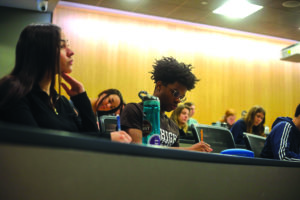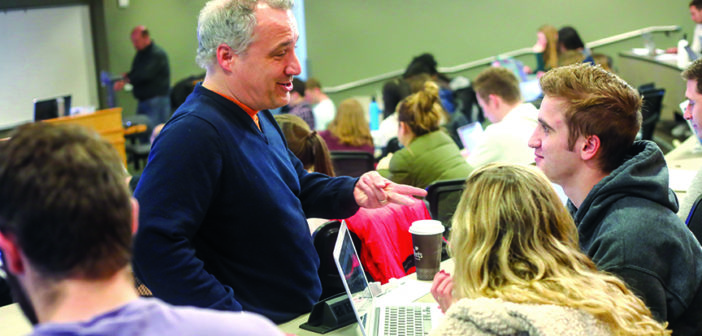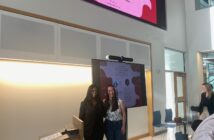St. Louis is the capital of Missouri.
Read that statement again. A trained bullshit-spotter might have realized it immediately. St. Louis is not the capital of Missouri. A simple Google search reveals that the actual capital of Missouri is Jefferson City.
A purposefully-mislabeled state capital, as in this case, is an example of what can be known as disinformation. The Merriam-Webster Dictionary defines disinformation as “false information deliberately and often covertly spread in order to influence public opinion or obscure the truth.”
Ziad Munson, an associate professor of sociology, believes disinformation has always been an issue, but says it’s become more of a problem because of changes in the structure of how we communicate.
“We are at a precipice in society,” he said. “The way in which we think about information and the way in which we think about truth, democracy and consent of the governed all depend on people being able to identify and call out BS in ways that are better than what they’re doing now.”
Munson created the course “Calling Bullshit” at Lehigh after learning about a course under the same name offered at the University of Washington. The aim of this course is to help students cultivate critical thinking skills, which they can use to navigate a world he says is awash in “bullshit.”
Munson said he wants students to leave his course with the ability to identify when they encounter mistruths and to have strategies for calling them out.

Lehigh students listening to Ziad Munson, professor of the course “Calling Bullshit,” on Feb. 18, 2020. “Calling Bullshit is a multidisciplinary course that aims to help students acquire the tools to combat disinformation. (David Owolabi/B&W Staff)
“We have a lot of technologies that we’re not accustomed to, our values and social structures have not kept pace to accommodate,” Munson said. “Part of the problem is this mismatch between the pace of technology and the pace of our lives. We need to catch those things up to technology.”
SOC 197: Calling Bullshit is not a requirement for any major at Lehigh, yet 58 students have enrolled in the course.
Sociology major Anneke Roy, ‘21, said she heard of the class through a course she took with Munson last semester. Roy said she was interested in how calling bullshit might relate to the 2020 election cycle and chose to enroll.
“(This class) is really taking education at Lehigh to the next step,” Roy said. “It’s shaping our education around the world. Instead of learning stuff, and going out and trying to find out how the stuff you learned applies to the real world, we’re actually learning things we can take and apply to the real world.”
Julian Savage, ‘23, was drawn to the course because of its eye-catching name.
Savage said “Calling Bullshit” has inspired him to learn more about how spotting disinformation can apply to other aspects of his life.
“The class is interesting,” Savage said. “We’re not learning stuff that doesn’t matter. It feels like everything we talk about is either important now or is going to be important in the future.”
Savage said the course has helped him gain an understanding of how to catch biases within the information he comes across, specifically in politics.
Roy also says “Calling Bullshit” has made an impact on her life.
“Being able to take the stuff we learn in this course, and being able to think critically about the information I get from Twitter has been huge,” Roy said. “I’ve checked myself a couple times before spreading disinformation.”
As Munson continues to teach the course, he wants his students to incorporate what they’ve learned in his classroom into their everyday lives.
“’Calling Bullshit’ is fundamentally a foundational course about critical thinking and making one’s way in an information world,” Munson said. “It’s an important skill set for students, regardless of what they want to do, what major they’re in or what career they’re going to have. I want to see what’s being taught in this class be a basis for everyone as they go out in the world.”






Comment policy
Comments posted to The Brown and White website are reviewed by a moderator before being approved. Incendiary speech or harassing language, including comments targeted at individuals, may be deemed unacceptable and not published. Spam and other soliciting will also be declined.
The Brown and White also reserves the right to not publish entirely anonymous comments.
4 Comments
“Savage said the course has helped him gain an understanding of how to catch biases within the information he comes across, specifically in politics.” It might be helpful in reading the Brown and White.
You’re kinda cranky lately, Robert. Not like you. What’s up?
Much more insightful is a Chris Hayes podcast from last summer with Adam Gopnik, in which Gopnik describes with lucidity how and why facts are not particularly important to the hard right (and why this is true on the right, but not on the left, which has its own problems) and why it’s a losing, self-referential fight to try to combat this sort of misinformation among the very people generating it.
The distinction is important. I have friends who’ll come to me with the same sort of Fox-generated nonsense that, say, Robert routinely parrots here. Neither has done the homework, and neither routinely does enough homework for some corner of what they’re saying to catch their ear and make them think, “Wait a second, that doesn’t sound right.” It’s the work of ten seconds’ research, and then another five minutes’ explanation, to debunk this stuff, but the difference between Robert and my friends is that the friends actually care about whether or not something is true. Sure, they’ll never do the homework themselves — fine, it’s laziness — but if you point it out and show them the problem, they’ll kind of let go of whatever nonsense they brought you. Or they’ll preface it with “I know x isn’t really true, but — “ because what they care about is something else that they were trying to point to, and they’ll stop trying to use the baloney to get there.
People like Robert, on the other hand, honestly don’t care what’s fact and what isn’t. It’s not the value system they’re operating under; all the arguments are teleological. Nobody there’s interested in scientific methods; nobody’s going to say, oh gosh, you know, I had that completely wrong and I’m going to have to change my head about that. It is, however, a basic tenet of liberalism.
Also more interesting: how incredibly easily people are propagandized. You see it all over the interviews with primary voters. “Why do you think you’re going to vote for _____?” “Well, she’s just so [insert the campaign or media’s exact phrases about the candidate].” That’s not new, it’s just a little horrifying to watch. It’s crazy effective. These aren’t people who are a single bit interested in calling bullshit on anything; they want a sports team to cheer for, and you can trace it through the polls. You can see exactly where Warren stumbled, for instance: the minute she proposed a tax on gazillionaires’ wealth over $50M. Alas for her, gazillionaires buy media companies for a reason. Within the week, a formerly Republican, prudent-household-economics maven with a midcentury consumer-protection portfolio and LBJ-flavored social-welfare plans became a flaming Communist Party commissar. Even people on the left were prefacing any discussion of her with a bit about how far to the left she was. It was amazing to watch.
But then that’s also America. We will buy literally anything. Rocks sold as pets. Mashed potatoes someone else will eat. Slabs of incredibly heavy rock to put on top of wooden cabinets and use as ktichen counters. Goop. Pie in the sky by and by. White energy massages in which the masseur gently massages the air around your body (hella easier on the hands). Doughnut-fuelled evangelism. The idea that freedom must be good, even though most people can’t think what to do with it once they’ve got it. Something essential would be lost if we were all of a sudden sober and circumspect.
Okay, B&W, that’s more than you deserve. I’m taking time off. Try to write smarter things, and Jordan, finish the story about Miller.
If I wasn’t cranky before and I wasn’t; I probably should be now, which I am not. “…the same sort of Fox-generated nonsense that, say, Robert routinely parrots here.” My thoughts and opinions are my own. If what I say equates with “Fox-agenda” in your mind, think again. I have processed an idea and think it makes some sort of sense. I do try to listen to all sides even though the left and the right both sound off key much of the time. With Senator Schumer sounding similar to President Trump in his regard for some people in government he disagrees with, I might think there is something malignant in New York (NYC) water. I fear its only a lack of respect for anyone who is different. Day to day existence in NYC can seem to many like a battle with enemies (chime in New Yorkers) so maybe it is an overreaction. To generally say I am parroting is criticism that can’t be denied well because it is not based on anything I actually wrote but only an impression. I have no ability to be enlightened by any insights you may have because you don’t provide any insights. It’s similar to the political debates that avoid useful statements and attack character. Surely you don’t post in the Brown and White (B&W) to pick up votes.
“Nobody there’s interested in scientific methods; nobody’s going to say, oh gosh, you know, I had that completely wrong and I’m going to have to change my head about that. It is, however, a basic tenet of liberalism.” I’m not sure that the scientific method is a basic tenet of liberalism. If by liberalism you mean the current leanings of the American Democratic party (LIBS), I think it may be a claim that is made. I don’t believe it.
Liberalism: 2a often capitalized : a movement in modern Protestantism emphasizing intellectual liberty and the spiritual and ethical content of Christianity
b: a theory in economics emphasizing individual freedom from restraint and usually based on free competition, the self-regulating market, and the gold standard (see GOLD STANDARD sense 1)
c: a political philosophy based on belief in progress, the essential goodness of the human race, and the autonomy (see AUTONOMY sense 2) of the individual and standing for the protection of political and civil liberties
specifically : such a philosophy that considers government as a crucial instrument for amelioration of social inequities (such as those involving race, gender, or class).
I think I could argue that these definitions are such that the much of the political spectrum could argue that they are liberal and that others on the spectrum are not. The scientific method might lose it’s way here.
And what is the bias of B&W and what I call liberal media and LIBS, DIVERSITY (a political movement with an ever growing agenda and power), caps to distinguish it from diversity which is a fact of existence. Diversity is a sign that all should be respected and have worth and have the opportunity to contribute to society; DIVERSITY demands respect and seeks power to gain advantages in society. An increasingly more liberal (LIBS) Lehigh (professors, students and administration) is DIVERSE. A recent article on Posse Scholars shows DIVERSITY (not precluding diversity) in action. I’m not saying the Posse Scholars have an agenda but I think it is clear that The Posse Foundation does.
Back in the 60’s students on the left demanded free speech for their causes now the situation is reversed as conservative students demand the same rights.
https://www.sandiegouniontribune.com/news/california/story/2020-02-04/cal-state-to-pay-240-000-to-settle-pro-life-lawsuit I see B&W coverage as varied and factual but am not sure that it is unbiased.
“Also more interesting: how incredibly easily people are propagandized.” https://www.cbsnews.com/news/cornavirus-corona-beer-they-have-nothing-to-do-with-each-other/ More interesting may be how many of those people there are; a great advertisement for real democracy.
“You can see exactly where Warren stumbled, for instance: the minute she proposed a tax on gazillionaires’ wealth over $50M. Alas for her, gazillionaires buy media companies for a reason.” I read today that the reason was that she failed to say that the money to pay for her health care system had to come from the middle class. I think a tax on income is bad but a tax on wealth is worse. A communist would say just take it all now. A capitalist would move away. People of modest means would spend it and rely on the government when they ran out of wealth. The poor would think it was a great idea. Really the rich get the most advantage from the system so they should be taxed more to benefit those for whom the system does not work. The question is how much to take and how much to redistribute as well as what responsibility does each have to the system?